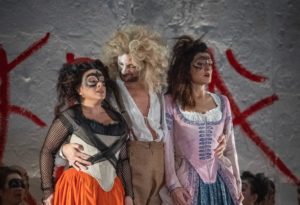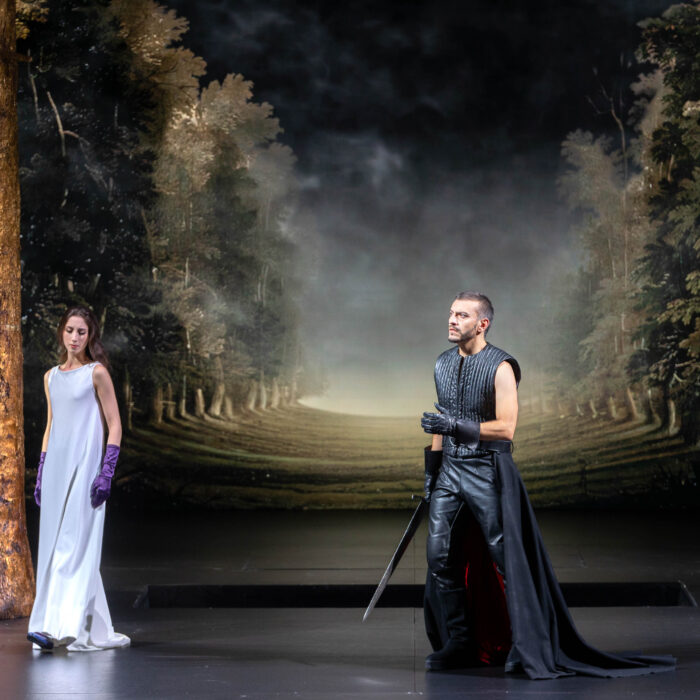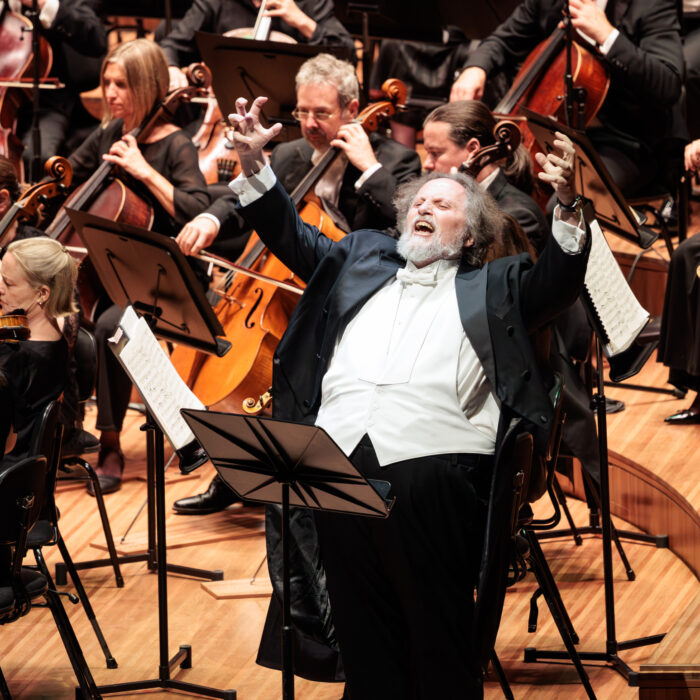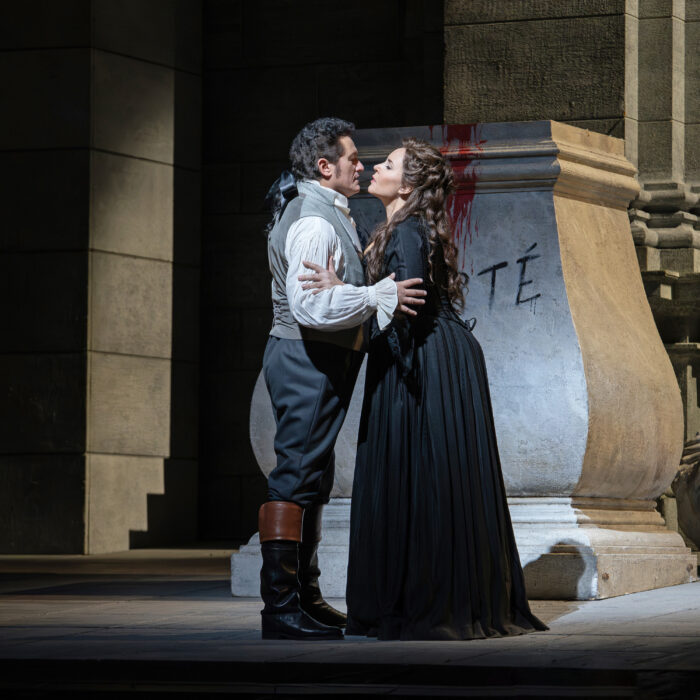
Teatro Comunale di Bologna 2018 Review: Don Giovanni
By Alan NeilsonNo one can complain that Jean-Francois Sivadier, the director for Bologna Teatro Comunale’s production of “Don Giovanni,” failed to think carefully about the the work’s underlying themes, its dramatic drivers and the construction of its characters, in fact, the problem was the exact opposite.
His program notes teem with observations and ideas; in one short paragraph alone, there is enough material for an entire performance: he argues that, “theatre, death, liberty: three words which could be used to summarize the opera, its center of gravity…” Furthermore, “in ‘Don Giovanni’ the action does not advance in a straight line, but turns on itself with growing intoxication.” He also notes that “…it is a series of battles between men and women, master and servant, nobles and the people, pride and vengeance, reason and sentiment” and “the characters all act on impulse, without taking time to reflect.” In another paragraph he reflects on the need to “remove the fourth wall,” noting that the conductor, in his relationship with the singers, is the first person to breakdown the fourth wall, and upon whose role Sivadier wishes to build, and to develop his production. Why? Because Don Giovanni does not like walls, he is a man “who wants to be constantly observed.”
All this is but a taste of Sivadier’s fertile mind. The problem was that he was determined to cram this eclectic mix of ideas into a single production, the results of which were decidedly predictable; it lacked focus, themes and ideas blurred, and coherence was sacrificed. Certainly, there were good ideas, but they were swept along in the general mayhem, and failed to establish themselves with any conviction.
General Chaos
The scenographer, Alexandre de Dardel, created sets which were in-line with Sivadier’s ideas, and were thus equally unfocused. Moreover, they were unattractive, unimaginative and fairly drab, consisting of a wooden tilted stage, with few props, over which different colored lightbulbs would descend and light up with varying degrees of intensity. The back wall was in white plaster, fragmented into large slabs. Around the sides of the set sat people, shattering the fourth wall and the audience’s illusions, at least that was the idea. Obviously, the stone guest plays a pivotal role in the opera, so throughout the second act a stonemason worked behind a screen, which at the appropriate time was removed to reveal a plaster statue, which according to Sivadier helps contrast the “tensions between the real and unreal… …Don Giovnni’s ‘hot’ body and the coldness of the statue,” not that its relevance to the Commendatore was obvious, who wandered on and off the stage, smoking a cigarette.
Likewise, the costumes, designed by Virginie Gervaise, were not particularly successful. At the most fundamental level they failed in their role of helping to define the characters. This was particularly damaging in the case of Don Giovanni himself, whose dull attire, meant that he often merged into the background. Not that this was a fatal flaw because Sivadier had the characters change clothes on occasions, from period into modern dress. No doubt another attempt to bring the fourth wall crashing down. Donna Elvira started the evening with an eye-catching elaborate 18th century pink costume, but ended in a dull modern top and skirt, looking as if she had just finished cleaning the house.
Destroying the Don
Worse still, was the fact the characters were not all carefully developed. Don Ottavio, for example, who at best is a well-meaning wimp, strutted around the stage with more than a little swagger in his step, and looked more than capable of dealing with Don Giovanni. The real problem, however, centered on the character of Don Giovanni himself, who faded too easily into the background, and lacked the necessary charisma to convince. Having him squabble with Leporello just before the second act, as the audience took their seats following the interval, trivialized the role, and helped destroy the audience’s belief in the character, as Sivadier probably intended.
Further problems existed with the balance between the comedic and the serious elements of the drama. Although not noticeably trying to downplay the comedy, the interpretation failed completely to generate humorous interactions; the only laughter from the audience resulting from a reading of the surtitles. Part of the responsibility for these problems must also lie with the directors for the Bologna performances, Richard Zanouda, Federico Vazzola and Milan Otal. Sivadier, the original director was not charged with its direction in Bologna.
Nevertheless, the production did have its moments. The final scene, following Don Giovanni’s descent into Hell, in which the rest of the cast reflect on their situations and congratulate themselves on his demise, is notoriously difficult to integrate into any presentation, but in this case was splendidly constructed. Standing behind the rest of the cast, Don Giovanni dressed only in white underpants, his long Dureresque hair cascading over his shoulders, he gave a Christ-like impression, as he continued to manipulate his victims, as they moved in concert to his direction.
Surer Footing
Musically however, the musical director, Michele Mariotti, ensured the performance proceeded on a much surer footing. He produced a detailed and refined, although occasionally understated reading, from the Orchestra del Teatro Comunale di Bologna, in which he achieved a pleasing musical balance, and did well in compensating for a certain amount of inconsistency from the singers.
Although this was the second cast, there were some very good performances, which was dominated by Raffaella Lupinacci as Donna Elvira, who put in an accomplished and polished presentation. Her wonderful technique, vocal beauty and intimate knowledge of the character enabled her to create a convincing portrait of Don Giovanni’s obsessive cast-off. Throughout the performance she sang with confidence and authority, displaying a wonderful degree of vocal subtlety, full of carefully placed accents and colorful shadings, in what was an expressively compelling reading.
Her final aria, “Mi tradi quell’alma ingrata” was the highpoint of the evening, in which Lupinacci perfectly captured Donna Elvira’s conflicting emotions; the beauty of her colourful voice, alongside her carefully crafted coloratura, helped to create what was a heartfelt reading, for which she received deservedly enthusiastic applause.
The Spanish soprano, Ruth Iniesta, playing the role of Donna Anna, gave a forceful presentation, in which she paid close attention to characterization. Engaging fully with Donna Anna’s emotional states she created a compelling and expressive presentation. Her voice displayed power and agility, and she sang the aria, “Non mi dir, bell’idol mio,” in fine style, impressing with her attractive upper register, her sparky coloratura and nicely formed phrases.
Davide Giusti was too forceful in his portrayal of the thoughtful and dutiful Don Ottavio. His physical bearing, confident gestures and assertive costumes were not those of of the servile Don. Unfortunately, he also struggled a little vocally, although he is not without quality. The voice has a pleasing timbre, but often his delivery was insecure and uneven. His aria, “Il mio Tesoro” was reasonably well-rendered, displaying the requisite feeling, but lacked the subtlety and sweetness which defines the piece.
Zerlina was played by Erika Tanaka from the “scuola dell’opera,” who made a strong impression. She was vibrant and playful, flirtatious and compassionate. She possesses a light, bright soprano, into which she injects vitality and enthusiasm, producing a sound which can really sparkle. Her phrasing is neatly defined and she projects her voice well.
However, her onstage partner, Roberto Lorenzi, was a little disappointing in the role of Musetto. The voice certainly has a pleasing tone, and his articulation is good, but at times it is a little inflexible. More damaging, however, was his inability to project his voice effectively, and something which he needs to address if he is to realise his undoubted potential.
Il Commendatore was essayed by Stefan Kocan, who put in an accomplished performance. He has the necessary stage and vocal presence to convincingly challenge Don Giovanni. The voice is strong, secure and exudes authority.
Not Quite There
Which leaves Don Giovanni and his side-kick, Leporello. The success of any presentation of “Don Giovanni” will depend largely upon the success to which Don Giovanni is essayed, and on his relationship with Leporello. First and foremost, the Don must be charismatic. Unfortunately, Alessandro Luongo was lacking in this respect, and the obvious negative dramatic consequences followed, although weak direction and insipid costuming were equally at fault. His acting tended to be slanted towards big gestures, which did not convince. Vocally, Luongo has a good voice but displayed inconsistency in application. Certain scenes were very well-sung, for example the finale of the second act in which he he managed to capture Don Giovanni’s courage, singing with a carefree swagger in his voice, and did more than anyone to make this scene the most successful of the evening. At other times, however, he was unable to stamp his authority on the role; his aria, “Finch’ han dal vino,” was sung well-enough, but lacked the necessary flashes of brilliance and versatile vitality to lift it above the commonplace. He showed ability in characterizing Don Giovanni, but generally lacked the firm stamp of authority to demand attention.
Sivadier rightly drew attention to Don Govanni’s relationship with Leporello, which he sees as symbiotic, “Leporello cannot exist without Don Giovanni and vice-versa,” which is, of course a valid and interesting observation, but it was difficult to see any evidence of this in the production. Moreover, the relationship itself never gelled beyond a superficial level, and an opportunity was missed; there were failed attempts to play up the humor and to highlight the inequality in their relationship, but the destruction of the fourth wall helped to undermine this aspect.
It fell to Omar Montanari to play the role of Leporello, who gave a solid vocal performance. His recitatives were carefully crafted; inflecting the voice with intelligently placed accents and colorful shadings he successfully gave expression to their emotional and literal content. He was, however, slightly less successful in singing his arias; his presentation of the famous catalogue aria was adequate, but too conservative, lacking the necessary zest and flamboyance, but it did display the pleasing timbre of the voice. “Ah, pietà! signori miei!” was sung with a greater degree of expressiveness and created a better impression. On the acting side, it was notable how he was unable to generate laughter from his character.
Having reviewed Montanari playing comedy roles on a number of occasions, it was clear that the responsibility for this shortcoming lay with the directors, for he has always proved himself to be accomplished in this area.
This was the final production of Mariotti’s tenure as Musical Director at the Teatro Comunale, Bologna, and unfortunately it was a disappointing way to bring it to a conclusion. Certainly, this was not in any way his fault, as the orchestra produced a very pleasing performance of the work. The staging, however, left a lot to be desired, it lacked shape and focus, and the mise-en-scene, notwithstanding the final scene, were dull and failed to engage.


